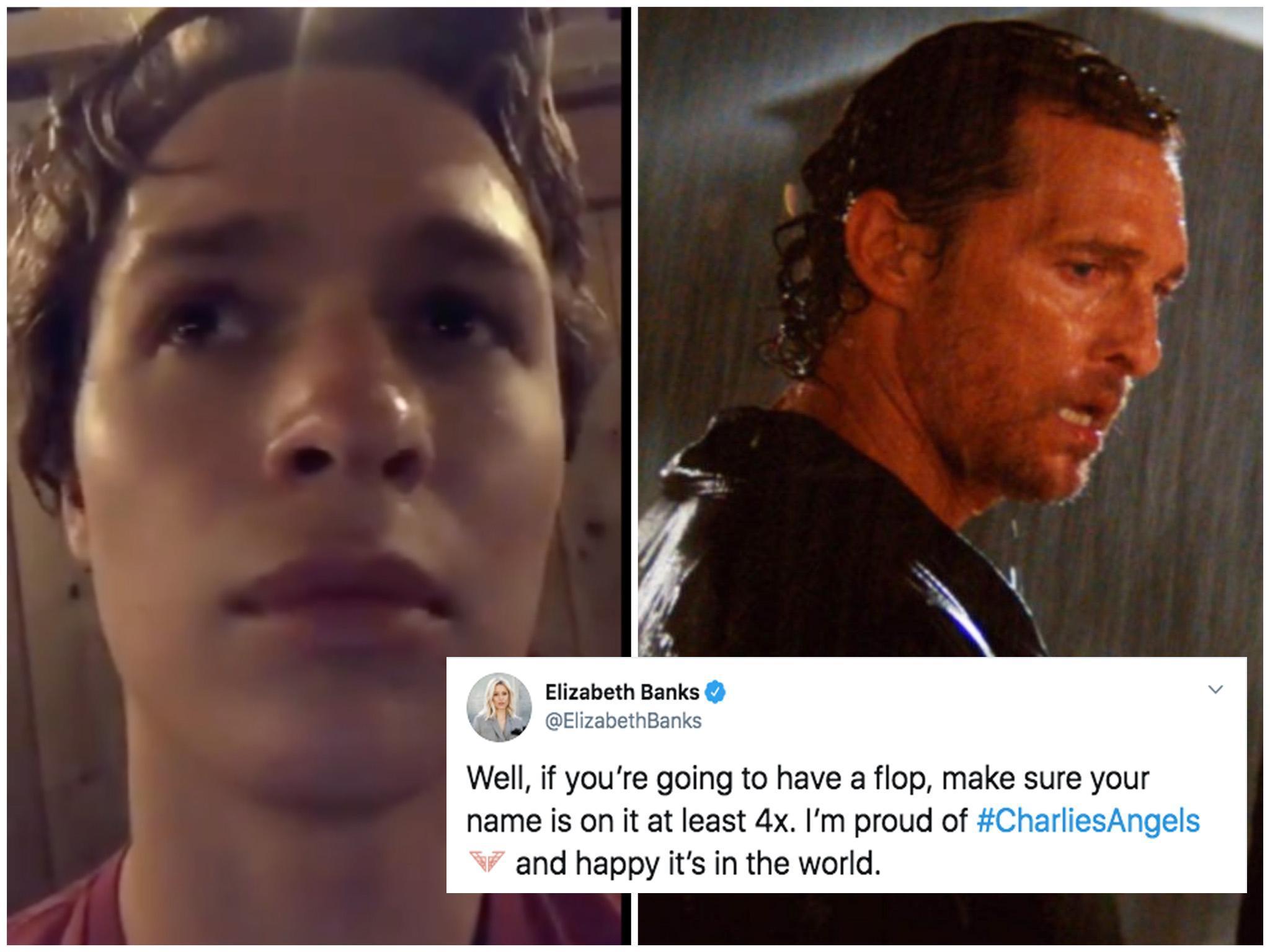I’m sorry you hated my movie: Why 2019 has been the year of the post-box office flop apology
Where once flop movies rapidly disappeared into the ether, 2019 has seen box-office disasters trailed by A-list apologies, bargaining tactics and wounded pleas for a second chance, writes Adam White. What’s driving it?


This has been the year of the post-flop confessional. It began early. When the ludicrous melodrama Serenity opened to dismal reviews and lowly box-office takings in January, the film’s star Anne Hathaway took to Instagram to defend it. “Matthew and I are learning our film isn’t easily broken down into sound bites,” Hathaway wrote, a generous way of saying that audiences had been baffled by the film’s bonkers twist ending.
“I find Serenity to be a thrilling, ambitious, violent, spiritual, erotic, charged, dark, damning, contradictory, maddening, lushly intelligent film,” she continued. “It asks a lot of the audience. It exists outside cut-and-dry, black-and-white moralising, beyond the realm of ‘thumbs up’ and ‘thumbs down’, ‘it sucked,’ ‘it was bad-ass”, etc. It will need some analysis and conversation after... I hope you’ll consider giving us your time and attention.”
At the time, the statement seemed very much in the Hathaway wheelhouse – open-hearted, slightly too prepared and a little exhausting. But as more and more Hollywood types began to emulate this kind of wounded pleading, it became clear that it was less a Hathaway one-off, and more a cultural trend.
Almost every high-profile flop of 2019 has been met with post-mortems, sad monologues or mea culpas from crestfallen stars and filmmakers. It’s essentially become a part of the modern celebrity press tour. Not only do famous faces answer inane video questions for Buzzfeed in the hopes of going viral, they now write self-aware tweets about their own failures when things go awry.
When the high-profile adaptation of The Goldfinch died spectacularly upon release, Ansel Elgort made his disappointment known. “There is a lot of good in the film,” he said plaintively on Instagram Live, the camera zoomed in tight on his face. “The film does work. People who see it enjoy it and are moved by it… It’s still in theatres. Take your mom.” His plea fell on deaf ears.
“Anyone out there saving Booksmart for another day, consider making that day today,” director Olivia Wilde urged her Twitter followers, after her wonderful teen comedy underperformed in its opening weekend in May. “We are getting creamed by the big dogs out there and need your support.”
Other, less well-made, flops were met with similar statements. “It clearly is a movie that didn’t connect with audiences that didn’t see it, and it didn’t connect enough with audiences that did see it,” director Simon Kinberg confessed to KCRW several days after X-Men: Dark Phoenix bombed, becoming the least successful X-Men movie in history. “That’s on me,” he added.
“I’m sure we could write a book on why it didn’t work,” director Tim Miller said when Terminator: Dark Fate opened to just $29m (£22.4m) in its opening weekend – on a budget of at least $185m. “I’m still not sure and I’m processing, but I’m very proud of the movie ... Even if I’m going to lose the fight, I still feel this obligation to fight because that is what the director is supposed to do.”
There was Godzilla: King of the Monsters, too – next year’s sequel, Godzilla vs Kong, “will deliver for fans in the way they were looking for”, Warner Bros chair Toby Emmerich promised. And the Natalie Portman astronaut drama Lucy in the Sky, of which director Noah Hawley insisted: “I do think history is full of movies that were not critical successes that, over time, became redefined as hugely successful creative endeavors.” Not to mention the terrifyingly unsuccessful Shining sequel Doctor Sleep. “Box office numbers aside,” Stephen King tweeted, “Mike Flanagan’s film is excellent!”

Watch Apple TV+ free for 7 day
New subscribers only. £9.99/mo. after free trial. Plan auto-renews until cancelled.
ADVERTISEMENT. If you sign up to this service we will earn commission. This revenue helps to fund journalism across The Independent.

Watch Apple TV+ free for 7 day
New subscribers only. £9.99/mo. after free trial. Plan auto-renews until cancelled.
ADVERTISEMENT. If you sign up to this service we will earn commission. This revenue helps to fund journalism across The Independent.
This month alone has seen Elizabeth Banks joke through the tears after her Charlie’s Angels reboot – which she directed, wrote, produced and starred in – appeared dead on arrival. “Well, if you’re going to have a flop, make sure your name is on it at least four times,” she tweeted. And even Last Christmas doing reasonably well at the box office hasn’t stopped its director Paul Feig from unnecessarily acknowledging all the critics that hated it. Faced with a one-star review from Rolling Stone, Feig tweeted: “As a lifelong Rolling Stone reader, I sincerely thank you for your opinion. We can’t win everybody over but we will continue to try! I swear all of our hearts were in the right place. Can our one star at least be a really really big star?”
In one sense, this kind of emotional oversharing shouldn’t come as a surprise. Regardless of the ubiquity of filters or secret Instagram accounts that only your closest friends know about, social media has always encouraged at least a veneer of honesty and truthfulness. And while celebrities online possess a degree of artifice that far surpasses that of us norms, there is a certain benefit to a famous person being publicly hurt or disappointed. Whether it’s Banks joking about her flop movie, or Elgort embracing his status as an Instagram “sadboi” (internet slang for emotional, pseudo-philosophical young men), it’s a PR boon – you are seen as human, earnest and vulnerable, rather than an untouchable, otherworldly A-lister.
But removed from the PR angle, such online reactions also provide fascinating insight into the Hollywood climate of 2019. There’s no particular throughline in the movies that have given way to such emotional outbursts, with unasked-for reboots just as dicey a proposition this year as a major studio movie built around an original idea. They do, however, seem to signal an atmosphere of rampant terror over where the film industry is headed, with creatives under incredible amounts of pressure to deliver, despite no one truly knowing what audiences want to see anymore.
Thanks to the internet, every box office tumble is recorded daily on Box Office Mojo; each underwhelming opening weekend reported on with almost sadistic glee come Monday morning. No wonder everyone is an emotional wreck.

Looking back on 2019, however, I think there is something oddly moving about the outpourings of grief and public self-flagellation in regards to movies that were widely loathed. Sure, no one wanted these films enough to pay to see them, but it’s at least nice to know that Anne Hathaway was passionate about Serenity regardless of the outcome, and that at least one person really tried to stop Dark Phoenix from being an unmitigated disaster. People cared about these movies, so much that they were willing to be cringeworthy on social media in the immediate aftermath of their release.
In truth, we should spare a thought for the ones that didn’t earn such mourning. Where was Tessa Thompson’s emotional haiku about no one seeing Men in Black International? Or Cate Blanchett’s camera-phone recording on what went wrong with her adaptation of Where’d You Go, Bernadette?
Instead, they have been left to fade, ghosts from the year that was, fruitlessly, pining for the day someone comes along to explain what on earth they were thinking. They probably would have killed for an Ansel Elgort monologue.
Join our commenting forum
Join thought-provoking conversations, follow other Independent readers and see their replies
Comments
Bookmark popover
Removed from bookmarks